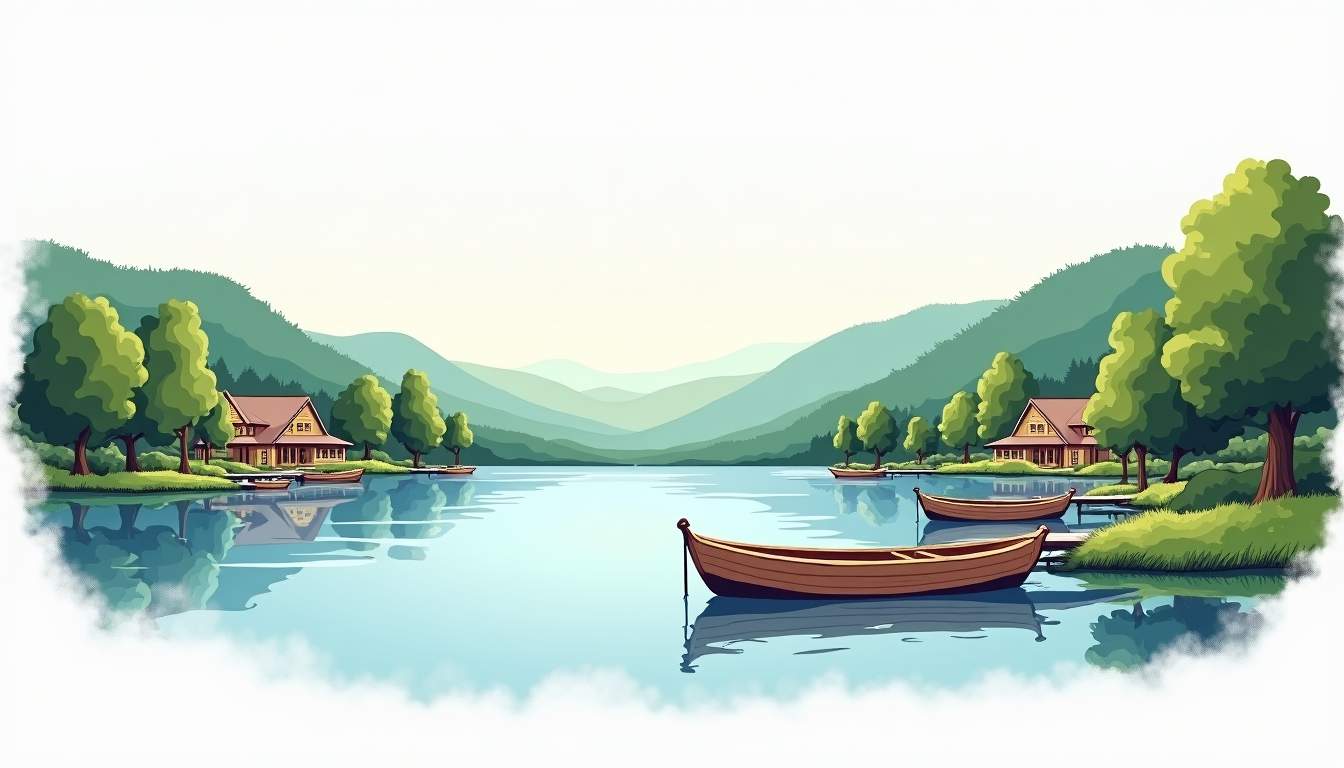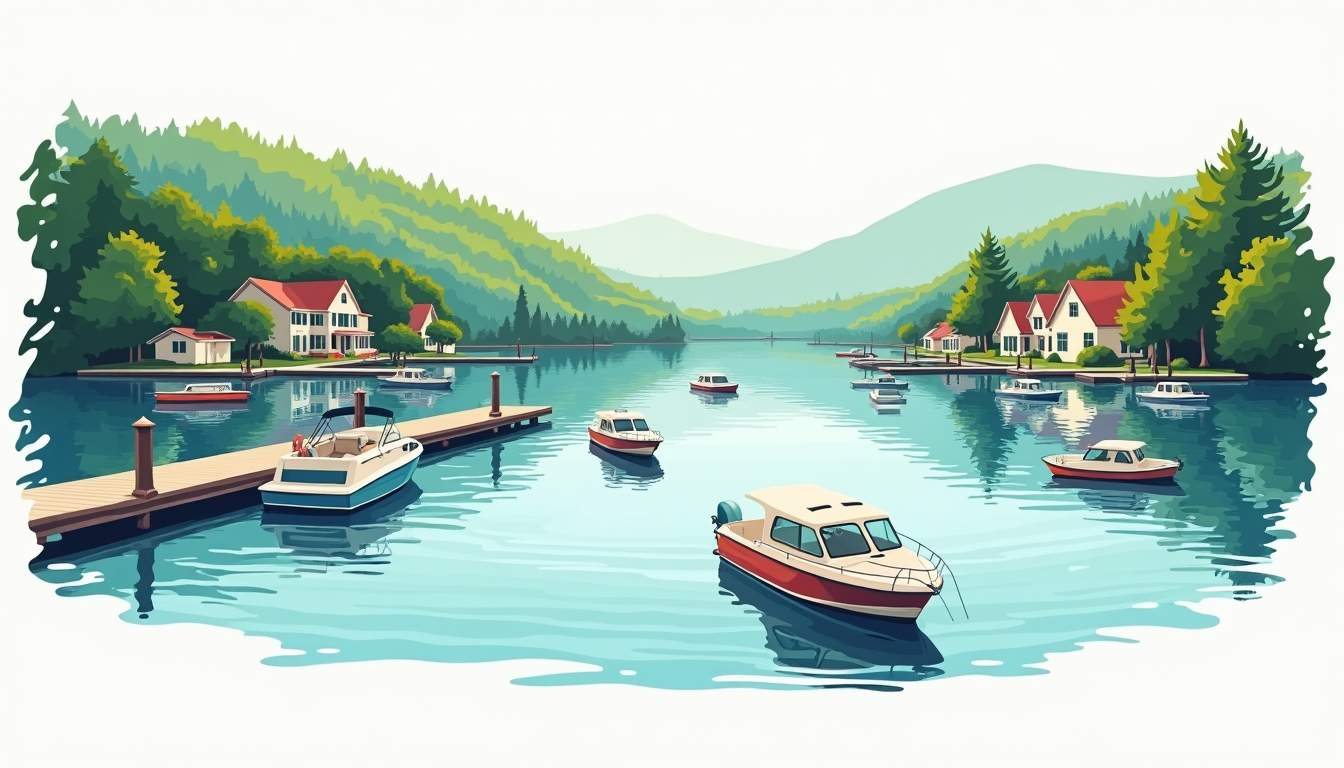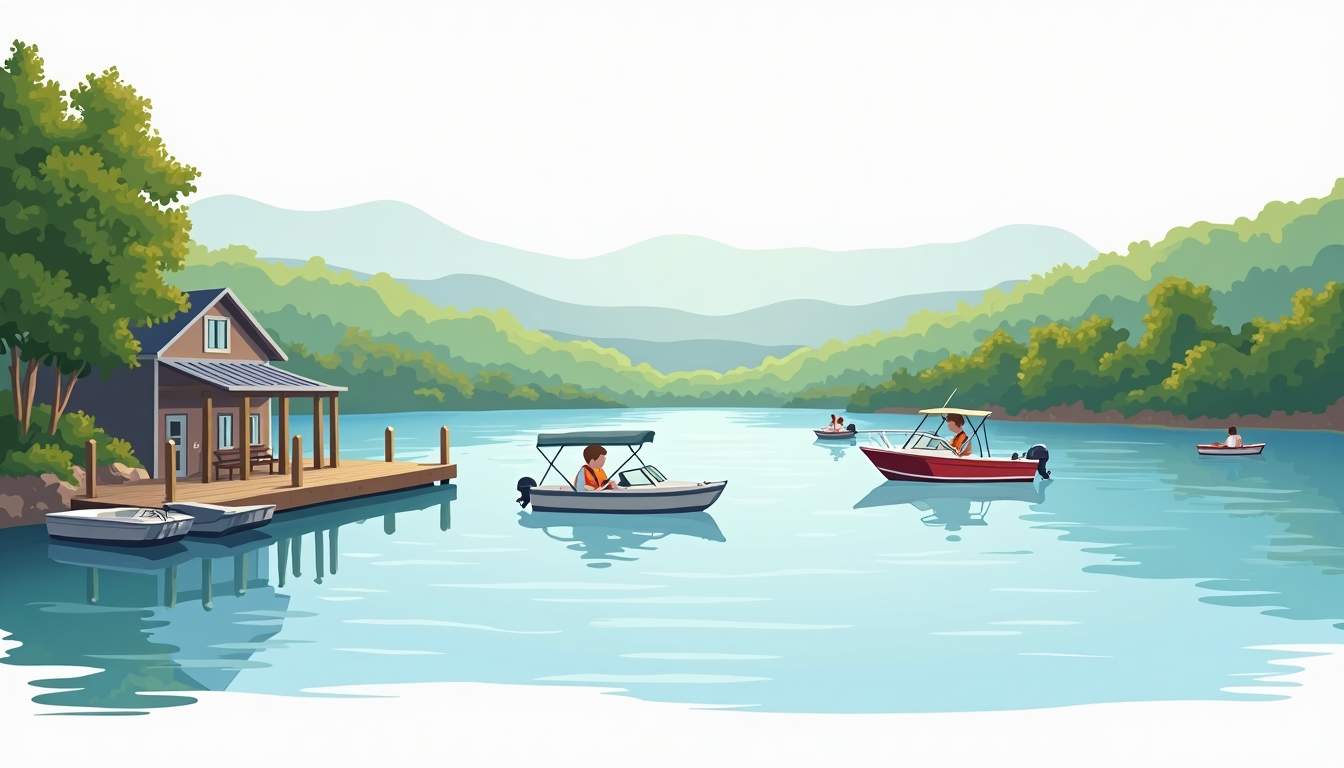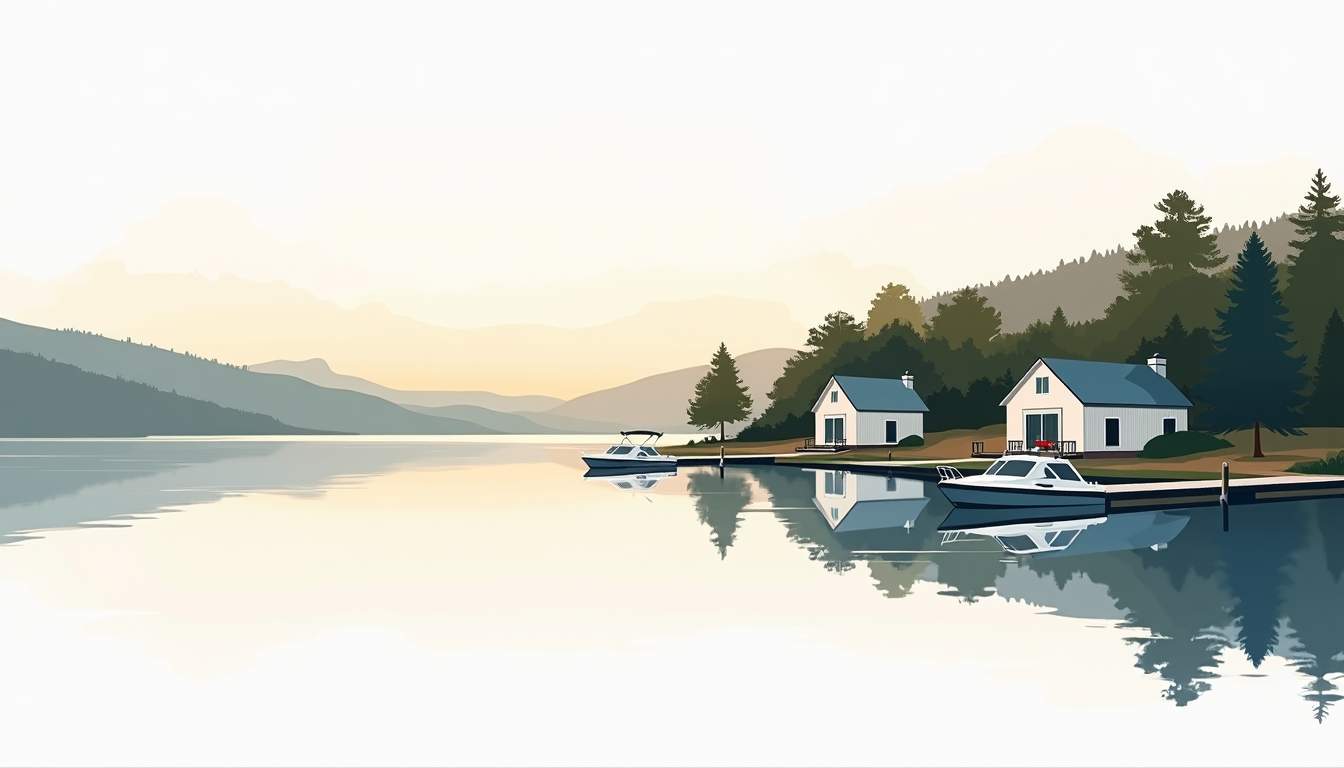
East Tennessee is a region defined by rolling mountains, wide waterways, and a longstanding tradition of lakeside living. Between the Tennessee River, Norris Lake, Douglas Lake, and other reservoirs, boating is woven into the lifestyle. Along those shorelines, club homes and private communities offer a blend of recreational convenience and real estate appeal. This guide covers where to boat, what kinds of crafts are common, how club homes work, buying considerations, safety regulations, and maintenance tips—everything needed to make the most of life on the water in East Tennessee.
Topography and climate combine to make East Tennessee attractive to boaters. The region’s man-made lakes and the natural river corridors create hundreds of miles of navigable shoreline, sheltered coves, and wide open stretches for wake sports, fishing, and leisurely cruises. Mild springs and long summers extend the boating season compared with more northern states, while autumn brings spectacular foliage reflected on calm waters.

Accessibility also plays a role. Major interstates and smaller state routes connect lakeside pockets to cities like Knoxville and Chattanooga, allowing easy weekend escapes or daily commutes for residents who choose club-home living. For many, the balance of rural serenity and practical access to urban amenities makes East Tennessee an especially appealing place to invest in boating and lakeside property.
Several lakes in East Tennessee stand out for size, amenities, and boating activity. Each offers a different feel—some are more developed with restaurants and marinas, while others emphasize quiet coves and private docks. Familiarity with the main waters helps when choosing the right area for boating preferences and property searches.
Norris Lake is renowned for its clear water and extensive shoreline. Hundreds of miles of coves make it a favorite for pontoon cruising, fishing, and secluded waterfront homes. Many boaters appreciate the lake’s deep channels and varied topography, which include rocky points and protected inlets. Marinas and boat ramps are plentiful, and some club communities provide private slips and docks to residents.
Douglas Lake features long, winding arms that offer both quiet pockets and lively summer hotspots. Anglers prize the lake for bass and crappie, while families enjoy swim-friendly coves and sandbars. Development around Douglas mixes public-access marinas with gated communities that provide boat storage, private access, and community docks.
The Tennessee River system, including Watts Bar and Chickamauga Reservoirs, presents large-scale boating opportunities. These waters support houseboats, larger cruisers, and extended trips between marinas. For those who want a mix of adventure and convenience, the river’s navigable channels and connection to other waterways offer unmatched scope in the region.
Boat choice in East Tennessee often depends on lake size, typical activities, and how a home is set up for docking and storage. Several boat types dominate the local scene.
Pontoons are ubiquitous for good reason: stability, capacity, and versatility. Ideal for family outings, fishing, and casual entertaining, pontoons handle calm lakes and protected coves with ease. Deck boats offer similar functionality with a bit more sporty performance for those who want to tow tubes or waterski occasionally.
For watersports enthusiasts, ski and wakeboard boats are a staple. These boats are often kept on larger lakes or areas of the Tennessee River where there’s room to build wakes and run slalom courses. Owners typically prefer communities with boat slips that accommodate trailers or have deep-water docks for easy launch.
Anglers favor small bass boats and aluminum fishing boats for access to shallow flats, cover, and rocky points. Fishing-focused club homes often include boat storage and quick ramp access, making it easy to get on the water early when the bite is best.
Club homes are residences situated within communities that offer shared amenities—think private docks, marina services, swimming pools, fitness centers, and organized social events. These communities vary from gated enclaves with strict covenants to more relaxed associations centered around lakeside living. The common thread is access: club-home owners gain conveniences that ease boat ownership and enhance recreational life.
Membership models differ. Some neighborhoods include marina access and boat slips in homeowners’ association (HOA) fees, while others offer optional memberships for extra services. Understanding the structure—what’s included, what costs extra, and how rules apply—should be a priority when evaluating properties.
Selecting the right community blends lifestyle preferences with practical needs. Location, amenities, rules, and long-term resale value all matter. Visiting multiple communities during different seasons provides perspective on traffic, noise levels, and seasonal boat activity.
Key amenities for boat owners include private slips, covered docking, on-site fuel and pump-out services, and secure winter storage. Additional perks—community boat launches, social clubs, on-site maintenance crews, and shuttle services to local marinas—can significantly improve the boating lifestyle. For those who entertain, amenities like lakeside parks, picnic areas, and waterfront dining add value.
Communities often regulate dock placement, boat size, and storage methods. Covenants may limit certain types of boats, impose noise curfews, or restrict rental activity. Reviewing HOA documents with a real estate attorney clarifies obligations, fines, and governance structure. It also reveals whether docks can be transferred with a property or leased separately, which affects ongoing costs and convenience.
Real estate near water adds complexity. Shoreline property can be subject to specific taxes, insurance requirements, and flood-zone designations. Prospective buyers should weigh immediate enjoyment against long-term maintenance and resale prospects.
Even lakeside properties can face flood-related risks from dam releases, heavy rains, or upstream management. Insurance premiums for waterfront homes vary by location, structure elevation, and local flood-mitigation measures. Boat insurance is separate and should match coverage needs—liability, physical damage, and trailer protection are common components.
Owning a dock is different from leasing a slip through a community or marina. Ownership confers permanence but also responsibility for repairs, compliance with waterway permits, and replacement costs. Leases simplify maintenance but can introduce long-term uncertainty—terms may change, and availability is never guaranteed. Evaluate both options carefully when closing on a property.
Safety on East Tennessee’s lakes means following state regulations and common-sense practices. Tennessee has age restrictions for boat operation, life jacket requirements for children, and alcohol restrictions tied to boating under the influence laws. Local lakes or communities might have additional speed limits and restricted zones, especially near dams, marinas, or swimming areas.

Life jackets, throwable flotation devices, fire extinguishers, visual distress signals, and an emergency whistle or horn are standard requirements. Kids should always wear properly fitted life jackets, and adults should keep a stash of appropriately sized vests for guests. Regularly checking batteries, bilge pumps, and navigation lights prevents small malfunctions from turning into emergencies.
Respect buoys, slow-no-wake zones, and other navigational markers. Courtesy on the water includes minimizing wakes near docks and shorelines, maintaining safe distances from swimmers and other boats, and observing quiet hours established by communities. Good behavior preserves both safety and relationships with neighbors.
Boat ownership comes with predictable chores: regular engine service, hull cleaning, winterizing, and dock upkeep. Planning maintenance on an annual cycle reduces surprises and expensive repairs.
Even with milder winters, proper winterizing protects engines and plumbing from cold snaps. Fuel stabilizers, battery storage, and engine fogging are common precautions. Many club communities and marinas offer covered storage and shrink-wrap services, which simplify preparation and reduce wear from weather exposure.
Minor upkeep—waxing, upholstery care, and simple engine checks—can be handled by owners who are comfortable with hands-on work. Complex tasks like outboard overhauls, electrical system repairs, or hull damage are best left to professionals. Using reputable service providers helps preserve warranties and ensures compliance with safety standards.
Owning a club home in East Tennessee offers more than a place to dock a boat: it opens access to community events, fishing tournaments, holiday parades on the water, and a slower-paced rhythm that centers outdoor recreation. Social life often forms around shared activities—dock parties, boating clubs, and volunteer-led preservation efforts to keep waters clean and navigable.
Whether the focus is on quiet mornings in a fishing boat, spirited afternoons of waterskiing, or evenings on a porch watching the sunset, club-home living enhances accessibility to those moments. The combination of community amenities, organized events, and easy boat access creates a lifestyle attractive to families, retirees, and active households alike.
East Tennessee provides a rich tapestry for boating and lakeside living. From the crystal arms of Norris Lake to the expansive Tennessee River system, the region supports diverse recreational pursuits and a variety of club-home communities. Choosing the right location means balancing boating preferences, community rules, and long-term property considerations. Safety, thoughtful maintenance, and an understanding of local regulations keep waters safe and enjoyable.

For those drawn to life on the water, East Tennessee delivers unmatched combination of natural beauty, community amenities, and boating opportunity. With careful planning and the right community fit, a club home becomes the gateway to years of rewarding days spent on the lake.
Embrace the full boating and club-home experience in East Tennessee by making Tennessee National your next community. Set within stunning natural surroundings, Tennessee National offers luxury living with access to a private marina, waterfront dining, and exclusive amenities including a Greg Norman Signature Golf Course. Whether you prefer a move-in ready home or a custom build, here you’ll find the perfect balance of recreation, comfort, and community. Schedule a private tour today and start creating unforgettable moments on the water and beyond.